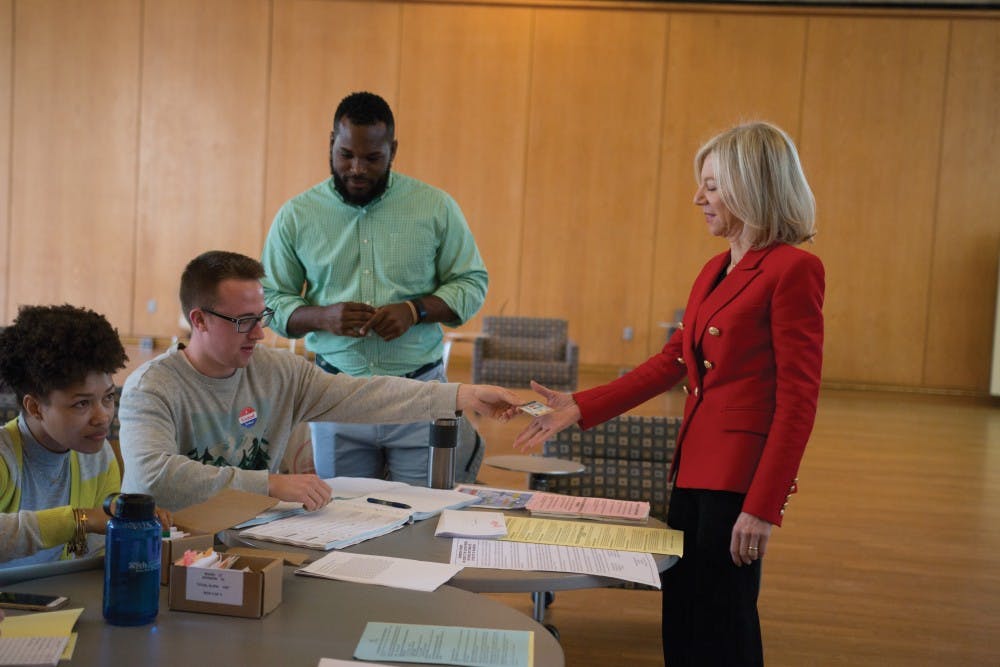
Penn President Amy Gutmann has indicated that she will probably not take up another public policy position, and will be focusing on the administration of Penn.
Credit: Julio SosaAcademia is often cited as being far removed from the “real world" — even more so from Capitol Hill — but a few scholars and groups at Penn break that mold.
President Amy Gutmann is one of them. She answered President Barack Obama’s request for her to chair his Presidential Commission for the Study of Bioethics in 2009 with a resounding yes.
“Since the President of the United States asked me, and I believe that it’s important to do public service, I said yes,” she said.
Gutmann felt that her research directly applied to the kind of practical application that a government commission would demand.
“I’ve spent my entire professional career teaching writing and ethical issues about public life and public policy,” she said. “It seemed natural.”
Some of the members of the commission were colleagues of Gutmann’s — Vice Provost of Faculty Affairs Anita Allen, for instance, but others she said she knew only “by reputation.” Among them, a Franciscan friar who is also an expert in bioethics and medical doctor, and Mohammed Ali’s wife.
In terms of the possibility of doing something similar in the future, Gutmann says right now she has enough on her plate.
“My entire focus right now is on Penn and Penn’s future,” she said. “So I don’t have any plans now to do this again and I probably wouldn’t do precisely this again, but I always welcome an opportunity and a call from the President of the United States to contribute to public policy that’s aligned with my experience and expertise, as long as I can think I make a difference with the time I can devote.”
Gutmann also said she thinks it’s important for everyone in academia, and people in general, to get involved with public policy or other ways to give back.
“I think it’s everyone’s responsibility to help their community and the world around them."
Gutmann isn’t the only member of Penn with connections to government commissions or public policy, more broadly. Entire institutions at Penn are dedicated to the subject. Both the Annenberg School for Communication and Wharton School have public policy centers. The Kleinman Center for Energy Policy also emphasizes real world application for environmental research. One of the lesser-known places on campus where academics connect to government is the Penn Program on Regulation.
Director of the program and law professor Cary Coglianese said the Penn Program on Regulation offers recommendations to regulatory government agencies and policy makers based on research. But Coglianese has personally applied his academic interests to policy in a number of ways, including serving as a consultant for government agencies, and most recently working for a National Academy of Sciences Committee.
“The general issue we’re looking at on this committee is how to do a better job of regulating high hazard activities,” he said, citing hazards associated with drilling and transporting petroleum or dealing with nuclear accidents — things that have “low probability but high consequence risk associated with them.”
Coglianese said the connection between academia and public policy is important, and he sees the Penn Program on Regulation as necessary for making that happen.
“I think a lot of times academic research is useful for society, but maybe academics are not always able to bridge the gap,” he said. “That’s one of the things that we try to do at the Penn Program on regulation is bridge the gap between rigorous academic work and policy, and show people in the policy world that rigorous academic work is useful to what they’re interested in.”
He’s not just concerned with lawmakers, either. The Penn Project on Regulation also has a blog that’s designed to make regulatory issues understandable and accessible for the general public. Beyond that, Coglianese said he feels that the public can benefit just as much from academic work as public policy officials can as well.
“I do think universities have an obligation to make research findings available to the public,” he said.
The Daily Pennsylvanian is an independent, student-run newspaper. Please consider making a donation to support the coverage that shapes the University. Your generosity ensures a future of strong journalism at Penn.
DonatePlease note All comments are eligible for publication in The Daily Pennsylvanian.







